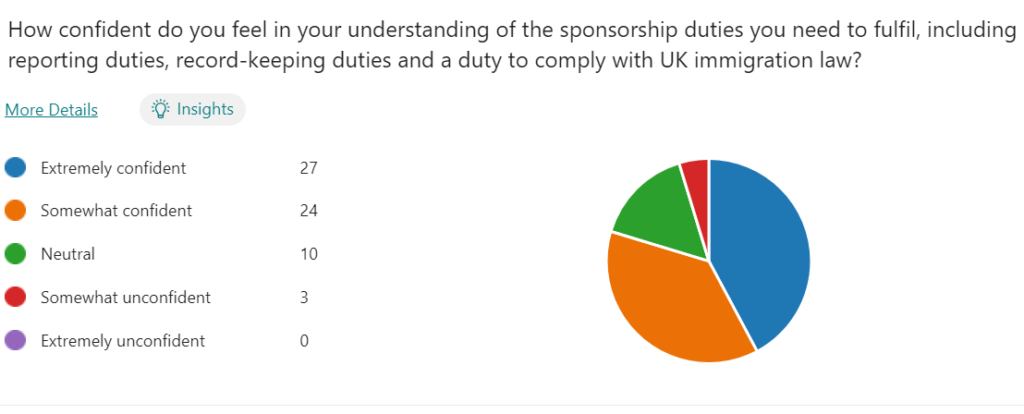Introduction
International recruitment requires extensive planning and a long-term commitment to provide resources, ongoing training and pastoral support to recruits.
It is important all Care Providers planning to recruit from overseas consider the human resource you will need to coordinate and manage activity within your orgnisation. Failure to do so will impact on your ability to retain any international staff.
Nationally, we have seen a rise in care providers losing their Skilled Worker Sponsor Licences following Home Office monitoring and intervention, highlighting a need for social care businesses to tighten their overseas recruitment procedures.
This page has been created in response as a helpful information resource to support our care sector and professional colleagues in understanding requirements and best practice in relation to overseas recruitment – we will share useful resources to this site on a routine basis.
In early 2024, Somerset Council commissioners conducted a survey of local care providers with sponsor licences to understand current levels of overseas recruitment and confidence from providers in relation to understanding of their duties as sponsors. 64 care providers responded to the survey (the majority from domiciliary care settings) with 80% indicating they felt either ‘extremely confident’ or ‘somewhat confident’ in their understanding of the sponsorship duties they had to fulfil. However, providers did indicate they would benefit from guidance and support with compliance.

UK Visa Sponsorship for employers
Care Providers need sponsor licences to employ someone to work for them from outside the UK – UK visa sponsorship for employers: Overview – GOV.UK (www.gov.uk)
The Home Office produced a FAQ document on Sponsor Compliance in January 2024, available here
International Recruitment Tookit
Recruiting internationally is one of the solutions that some adult social care employers use to address ongoing workforce capacity challenges.
International recruitment must always be carried out in a legal and ethical manner. Providers need to be supported to recruit staff from abroad in a way that meets the needs of those people when they arrive and are in post.
This toolkit, produced by the Department of Health and Social Care and Skills for Care in March 2024, aims to encourage and enable good practice in adult social care international recruitment, supporting ethical recruitment and offering guidance for organisations on new processes and how to refine international hiring procedures:
International recruitment toolkit – March 2024 (skillsforcare.org.uk)
For more information and helpful guides, visit: International recruitment (skillsforcare.org.uk)
Training Resources
RWK Goodman, specialists in employment law, provided a range of targeted virtual training sessions to the South West region’s care sector in the Spring of 2024 to support international recruitment.
Below is a summary of content plus the slides shared as part of each session to support local practice:
1) Compliance Training : https://somersetprovidernetwork.org.uk/wp-content/uploads/2024/04/Compliance-Training-RWK-Goodman-1.pdf
Content includes:
- Overview of Skilled Worker route including basics of points-based requirements for skilled workers.
- Sponsor licence holder compliance duties including: o Specifical of roles of internal key personnel;
- Mandatory reporting duties regarding migrant worker employment/ activities and organisational changes/restructures.
- Mandatory record keeping duties;
- What to do in cases of detected noncompliance;
- Home Office compliance visits and other methods of compliance checking;
- Overview of potential home office sanctions for breaches.
2) Right to Work Checks : https://somersetprovidernetwork.org.uk/wp-content/uploads/2024/04/Right-to-Work-Checks-RWK-Goodman.pdf
Overview of mandatory right to work checks imposed on all UK employers including:
- Overview on duty to prevent illegal working;
- Methods of right to work checks;
- Recent changes to accepted proofs of right to work;
- Impact on and overlap with sponsor licence duties;
- Potential consequences for failure to correctly carry out mandatory checks.
3) Ethical Recruitment Practices : Ethical Recruitment Training RWK Goodman
Overview of government guidance on ethical recruitment within care sector recruitment (which is a requirement of the funding) including:
- Code of Practice for the International Recruitment of Health and Social Care Personnel in England;
- Restrictions on active recruitment from named countries on the government’s ‘red list’;
- Ethical use of third party recruiters;
- Costs of international recruitment being passed on to migrant workers and risks of debt bondage and financial exploitation;
- Risks of noncompliance with minimum salary thresholds associated with recouperation of costs.
- Modern slavery risks and sanctions imposed for breaches of modern slavery laws.
Guidance for international workers in the care sector
Please see below a resource for international workers in the care sector, created by Justice & Care:
Guidance for international workers in the care sector
The resource provides guidance on workers rights, sponsorship in the UK, labour exploitation and support through the National Referral Mechanism.
Contents include:
- Your rights in the UK
- Joining a Trade Union
- Sponsorship in the UK
- Finding Alternative Sponsorship
- Additional work
- Labour Exploitation
- Modern Slavery and the NRM referral process
- How to raise concerns and get advice, and
- Food/Clothing banks
Driving Theory Support
The ability to drive is extremely important for workers in Somerset, especially in our more rural areas. Public transport can be infrequent and may not match shift starting times, for example. In addition, many overseas nationals can only drive on licences issued in their home countries for the maximum of a year. They then need to pass the British theory and practical tests to obtain a UK driving licence.
The language used in the theory test is extremely complicated, subject-specific and set at a high level for people who do not have English as a first language.
The East of England Local Government Association has developed some resources to help overseas nationals to pass their theory test which have been shared to support other areas – please visit Driving theory – EELGA SMP
Learning English in Somerset
Are you looking to learn or improve your English? There are friendly conversation clubs as well as English courses for speakers of other languages across our county – many of them are free or low cost to learners. For more information please visit: Learning English in Somerset | CCS Community Council for Somerset (ccslovesomerset.org)
Guarding against Modern Slavery
Care has been identified by the Gangmasters and Labour Abuse Authority as a sector where there is high risk of labour exploitation, including severe forms such as modern slavery.
Illegal and questionable practices include:
- withholding or paying sub-minimum wages
- providing sub-standard and overcrowded accommodation
- health and safety concerns related to excessive working hours, back-to-back shift working and a lack of training;
- poor access to personal protective equipment (PPE)
- some reports of debt bondage, where workers were required to continue to work to pay off large debts, or receiving just one meal a day instead of pay.
It is important we all recognise potential signs of Modern Slavery across Somerset and take appropriate responses to concerns identified.

Modern Slavery Helpline 0800 0121 700
Further Home Office information on identifying and reporting modern slavery
Visit the Anti-Slavery Partnership website
Other useful resources for commissioners and employers include:
- Self-assessment for businesses: Self-Assessment – Unseen (unseenuk.org)
- Establishing Modern Slavery Risk Assessment and Due Diligence in Adult Social Care: a Commissioning Officer’s Guide (local.gov.uk)
- The Unseen app provides a simple guide to recognising the signs of modern slavery and human trafficking and is a channel to report concerns in confidence. There is also a guide to types of modern slavery, an outline of key legislation, and an explanation of how to contact the Modern Slavery & Exploitation Helpline in 27 languages. This latter feature is useful for frontline professionals to communicate with people they suspect are victims of exploitation and who do not have good command of English. The app is on the phones of thousands of frontline professionals across the UK and is recommended by senior police officers and anti-slavery experts as an important tool in identifying and reporting human trafficking and modern slavery. It has been developed by Bath-based digital agency Storm. You can download the app at www.unseenuk.org/about-modern-slavery/download-the-app
- Somerset Safeguarding Adults Board Somerset Safeguarding Adults
